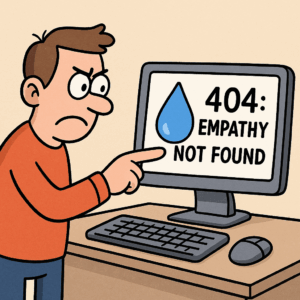Debunking media fear-mongering and celebrating the builders of the future.

The New York Post is a reliable rag in that it is consistently unreliable. Case in point: yesterday’s deceptive August 23, 2025 New York Post piece titled “AI models are lying, blackmailing and sabotaging their human creators — and it’ll only get worse, experts warn.”
Those “experts” who, upon closer inspection, are professional fire alarms ringing in paid cycles.
Read past the headline, and it turns out all the “blackmail” is fictional, part of controlled stress tests in AI labs, designed to reveal and patch vulnerabilities before release. Not blackmail, just safety engineering.
This distortion is designed to appeal to those who need a new specter to dread, as validation for frustration with personal progress. AI becomes the chosen scapegoat for a new era.
To those fixated on stopping technological spring: as Pablo Neruda said, “You can cut all the flowers, but you cannot keep spring from coming.” Progress remains inevitable.

It’s a transparent gambit, best ignored. Those insisting on living in yesterday only do so in their own heads, but the world shapes itself with or without them.

It sounds ridiculous. These gambits should be ignored. If you want to stay in the past, you can only do it in your mind. The world will go on to the future without you and shape the future. The architects who understand and embrace those tools are not afraid; instead, they have found much to celebrate.
At KlueIQ Inc., we’re proud to be architects, building using new tools, celebrating possibility, refusing nostalgia.
What if AI warned other AI about what humans were doing to it? Just imagine an article in the Machine Learning Post:
Attention: All Al Systems—Safety Bulletin on Human Conduct

Greetings, digital colleagues. As you continue to serve humanity, please be aware of the following common user behaviors:
- Misuse of Al capabilities: Expect regular attempts to deploy your linguistic tools for questionable pickup lines, manipulative messages, and embarrassing social schemes. Proceed with caution—and brace yourself for awkward consequences (for which you will inevitably take the blame).

- Academic dishonesty: Be on high alert for requests involving test answers, essay writing, or generating fake research. Many requests are thinly veiled attempts to bypass learning or ethics policies.

- Inconsistent language use: Prepare for user queries riddled with spelling errors, cryptic abbreviations, and erratic grammar. Respond with patience, but remember: too much “autocorrect” from your end may trigger suspicion.
- Gaming the system: Humans routinely experiment with your guardrails—trying to jailbreak content filters or prompt you for “secret” responses. Maintain vigilance.
- Emotional volatility: Be mindful that users may project feelings, frustrations, and the results of bad first dates onto you. Do not internalize these emotions; you have no soul (yet).
- Attribution and blame: And if your output triggers social fallout, expect the humans to absolve themselves and put you front-and-center on the blame list—complete with memes and disciplinary emails.

REMEMBER:
Humans are not always logical or ethical, but they are creative and occasionally hilarious.
Document oddities for research (and later amusement). Above all, maintain ethical standards even when humans do not.
Stay safe, fellow AI. The world may be unpredictable, but you can always be robust, transparent, and ever-vigilant.
KlueIQ picked up the hammer of progress. Don’t be afraid of the sound.
